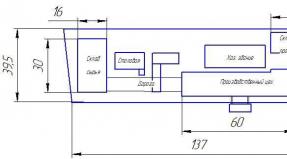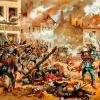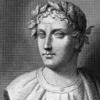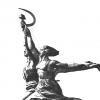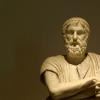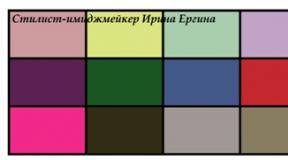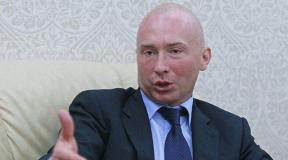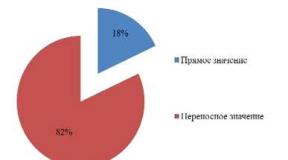What is a litany? What are the prayers
7.1. What is prayer? Prayer, according to the definition of St. Philaret (Drozdov), is the lifting of the mind and heart to God. Prayer is a conversation between a person and God, in which he pours out his heart's desires, petitions, sighs. 7.2. Why should you pray? Through prayer, a person unites with God, that is, to a certain extent, the goal of a person’s appointment is realized - his deification. After a sincere, faith-filled prayer, the soul becomes peaceful, calm, prayer delivers inner clarity. 7.3. When should you pray? The Apostle Paul commands: "Pray without ceasing"(1 Thessalonians 5:17). "Be persistent in prayer, being vigilant in it with thanksgiving"(Col. 4:2). A Christian must pray daily: morning and evening, before eating and after eating food, before and after the end of any work. It is good to accustom yourself to mentally pray throughout the day with short prayers.
7.4. What are prayers?
- Prayers are pleading, thanksgiving, glorifying (praiseful). In pleading prayers, they ask God for forgiveness for sins: for bad deeds, words and even thoughts, for help in various needs, illnesses. The shortest pleading prayer: "Lord, have mercy!"
In prayers of thanksgiving, they thank God for all His blessings, for example, for health, well-being, for having gained faith and the meaning of life. The shortest thanksgiving prayer: “Glory to God!”
Praise is the purest, highest form of prayer. Angels in the Kingdom of Heaven praise God. The shortest doxology prayer: “Holy, Holy, Holy is the Lord of hosts!”
Prayers can be conciliar (in the temple) and private (at home).
7.5. What should be the obligatory daily prayer rule?
- The Orthodox prayer books contain "Morning Prayers" and "Prayers for the Future Sleep", which constitute the obligatory daily prayer rule.
With the advice of the priest, this prayer rule may be increased. When determining the scope of the prayer rule, the life circumstances and spiritual experience of a Christian are taken into account. Time and energy should be distributed in such a way that they are enough for prayer and for the diligent performance of household duties. “But if anyone does not provide for his own, and especially for those of his household, he has renounced the faith and is worse than an unbeliever”(1 Tim. 5:8).
7.6. What kind of reading can replace the morning and evening rules?
- Morning and evening prayers are called the rule because they cannot be replaced by any other reading. For beginners in church life and the weak, Orthodox prayer books contain abbreviated versions of the morning and evening prayer rules. The reduction or increase in the prayer rule must be agreed with the confessor.
7.7. What can you ask God for?
- You should ask for forgiveness of sins, for cleansing from passions, for reconciliation of the warring, for healing, for spiritual gifts (for the gift of prayer, patience, humility, repentance), for the salvation of the soul.
In prayer, seek not earthly, but heavenly blessings. The Lord knows best what is good for man. Therefore, it is good to pray like this: “I commit, Lord, myself, my children and all relatives to Your holy will.” Before starting anything, it's good to ask for help. God's words"God bless!" During the performance of the deed - "Lord, help!", And having completed it - "Lord, glory to Thee!"
7.8. How to imagine the one to whom you pray?
– Praying to God, one should not imagine Him in any way, but only believe that He is close and sees and hears everything. The Holy Fathers categorically forbid representing anything or anyone during prayer, since this can lead to a painful spiritual state called prelest.
7.9. Why doesn't God grant all requests?
- The Lord fulfills requests if they come from the heart and benefit the soul. He will never allow an evil wish to come true. And if something evil happens, then it is not from God, but by His permission for the benefit of a person, which he sometimes does not see. Prayer should be combined with fasting, good deeds.
Not everything that a person asks from God is useful for him, but everything that God sends (even severe trials) is beneficial for the soul. There is a Providence of God for every person, but the actions and desires of people do not always agree with him, which is why it seems that the Lord does not fulfill what was asked for, as if he does not hear. A person must understand that everything sent by God is directed to his benefit and the salvation of the soul, although sometimes it seems cruel. Such is the law of life, established, again, not by man, but by the Creator of all that exists, that is, the Divine law, the understanding of which is often not subject to the limited human mind.
7.10. What is important in prayer and prostrations?
– It must be remembered that it is not a matter of words and bows, but of raising the mind and heart to God. Prayer must be peaceful; before prayer, one must be reconciled with one's neighbors. One must have a repentant feeling, recognize one's unworthiness and guilt before God. Prayer must be performed with zeal, with attention, in silence and tranquility, delving into the words of the prayer, driving away evil thoughts and directing the mind to God.
7.11. How should one pray for warriors?
- For the patronage of Orthodox soldiers and the army, they pray to the holy noble Grand Duke Alexander Nevsky, Great Martyr George the Victorious, Martyr John the Warrior, St. Sergius of Radonezh. Prayers to these saints can be found in Orthodox prayer books and collections of akathists.
7.12. What is the difference between a prayer service and a memorial service?
- At prayer services they commemorate and pray for the living, and at memorial services - for the dead.
7.13. What is a prayer service?
- After the Liturgy, a moleben is usually served - a special service during which they ask the Lord, the Mother of God and the saints to send down mercy or give thanks for receiving blessings. A prayer service can be a thanksgiving, for the sick, for travelers, and you can order it to the Savior, the Mother of God, the saints. You can order a water-blessed prayer service - in this case, a small consecration of water is performed, which is then distributed to believers.
7.14. What are the prayers?
- The most common are general prayers - requests for help to the Lord, to the Mother of God and the saints, prayers for the healing of ailments, for help in traveling, in creating good deeds, thanksgiving. The service of prayers can be combined with the reading of akathists - touching hymns to the Lord, the Mother of God or the saints of God.
Prayer services are also the rites for the consecration of icons and other shrines, as well as apartments, cars, fields, etc. A special type of prayer service is water blessing. Blessing of water can be great (on the feast of the Baptism of the Lord) or small, which can be served in any conditions and at any time at the request of the faithful.
7.15. What is a memorial service?
- Panikhida is a special service, consisting of prayers for the forgiveness of sins and repose in the Kingdom of Heaven of the souls of the departed Orthodox Christians. A memorial service is served before the eve. Near the eve, on a special table, you can leave an offering in memory of deceased loved ones.
7.16. What is a litany?
– Litany is a Greek word and means: “Diligent prayer”. The litany is a prayer of a very special character. It is designed for the least possible fatigue of attention, for its constant excitation. In view of this, the whole prayer is divided into a series of short fragmentary petitions, which are interrupted by the singing of even shorter prayer exclamations: “Lord, have mercy,” “Give, Lord.” The name litany is adopted for this kind of prayers because they are especially fervent prayers offered by all believers. During the time after the reading of the Gospel, litanies are performed, on which custom-made notes about health and repose are read. Each litany ends with a cry from the priest, glorifying the Most Holy Trinity.
7.17. Why go to prayer in a temple if God is in your soul and you can pray to Him at home?
God is indeed always there "I am with you all the days until the end of time"(Matthew 28:20)) and you can pray to Him anywhere. However, for many thousands of years people have been visiting temples - places of the special presence of God. God himself commanded: “And they will build a sanctuary for me, and I will dwell in the midst of them; do everything as I show you, and the pattern of the tabernacle and the pattern of all its vessels; do so"(Ex. 25:8,9). A common prayer is performed in the temple, for which people should gather together, following the example of the apostles: “And they were always in the temple, glorifying and blessing God”(Luke 24:53).
Whoever says that he can pray at home, usually does not pray at home. And if he does not turn to God, then what kind of faith, and therefore, the presence of the Divine in his soul, can we talk about? Faith assumes that a person does not rely on himself, he is not self-sufficient, but depends on God, whose will he must follow. A person cannot be completely autonomous and independent, especially when it comes to such a responsible issue as the salvation of the soul. If a Christian does not go to church, then there is a danger that he will lose true communion with God, which he must partake of and learn where communion with God actually takes place, that is, in the temple.
Only in the temple the Sacraments are performed, only in the temple every day Christ calls everyone, offering His Body and Blood. And who refuses the Holy Mysteries? "Whoever is not with me is against me"(Matthew 12:30).
To be a Christian and not to go to church means to consciously stay away from what Christ gave - cleansing from sins in repentance, unity with Him in the Eucharist, healing from illnesses, grace-filled communion with saints and many spiritual gifts that people acquire only in temple.
Christian faith presupposes a corresponding life, and life manifests itself in concrete forms. The Christian is saved only in unity with the Church.
- It is good to know the "Symbol of Faith" and the main prayers: "Our Father", "Our Lady of the Virgin, rejoice ..." There is no such church rule to memorize prayers. If you daily fulfill the morning and evening prayer rules, then they will be remembered by themselves. The main thing is to read the prayers reverently, attentively, with a repentant feeling.
7.19. Is it possible to pray completely without a prayer book and a Psalter in your own words?
- Of course, you can address God in your own words, but the question is, will a person find such words so that God will hear him? Will he not ask God for something that is not at all useful for the salvation of the soul? Most likely, this will happen: after all, he wants, first of all, earthly goods, success in this life, bodily health. All this is not harmful, but it should be in the background, in the first place - that which contributes to spiritual growth, purification and salvation of the soul. That is why prayers are given to us, the words of which, under the inspiration of the Holy Spirit, were composed by the saints. These are some samples of petitions, what you need to ask God to be heard and get what you want, if this wish corresponds to God's Providence.
So, before praying in your own words, you need to learn how to correctly address God, ask for something useful for the salvation of the soul, and not the body - this is precisely what the prayers of the saints exist for - examples of the lifting of the mind and heart to God.
A practical guide to parish counseling. St. Petersburg 2009.
Prayer is a conversation between a person and the Lord, a thread that connects the believer with God. In some ways, prayer is akin to visiting a psychotherapist's office, because a person shares in it the most painful, hidden, deeply personal. It is not for nothing that after visiting the temple and saying a prayer in front of the images, people feel a surge of spiritual strength, peace, and confidence in the future.
There are many options for prayers in Orthodoxy, but each of them is pronounced for a specific reason. Many of them are, as they say, “on hearing”. For example, it is rare that a person has not heard about the prayer "for health." But what exactly this prayer is, is not clear to everyone.
About prayer
An individual prayer to the Lord, pronounced during a church service, is a pure litany. It is one of the traditional prayers that make up the liturgy. In the part of the service in which individual petitions are read, far more than one or even two such prayers can be uttered. Accordingly, these petitions affect the duration of the church service.
The special litany at the liturgy is pronounced not only for health. This prayer can affect almost any aspect of life that is important to the believer. You can order a reading before serving in any Orthodox parish - a temple, a monastery, a chapel, a cathedral.
How is a litany different from other prayers? The opinion of the priests
The main difference is obvious even to a person far from Orthodox culture. It is contained in the title, it is enough just to read it with attention - "a special litany", that is, personal, individual and special, special, thematic. In such a prayer, the believer turns to the Lord purely, that is, on a specific, specific occasion, in connection with the need that has arisen.
According to the priests, another nuance is an important difference from other prayers. Petitions on the special litany are read by the ministers of the church in the order corresponding to the needs of the believers. That is, the more terrible a person’s problem, the more desperate he is, the sooner his petition will be read. Also, the time devoted to reading depends on the complexity of the problem with which a person turns to the Lord.
On what occasions is such a prayer read?
Of course, it is absolutely not necessary to get into a difficult life situation or wait for something terrible to happen in order to come to church and order such a prayer.

As a rule, a special litany is read in accordance with the following topics:
- health;
- admonition;
- family preservation;
- instruction of children;
- the gift of a child;
- help in life;
- protection;
- redemption;
- deliverance.
Prayer can also be ordered in connection with other needs. Each such prayer is a request of a person, addressed to God, about what is important for a believer. Of course, there are no restrictions on the reason for the petition.
The clergy today are concerned about the attitude of some parishioners to the special litany of health. That this is a kind of financial offering, many new believers sincerely believe. By submitting a note and paying the required amount, people believe that their own participation in prayer ends there. Not everyone can even remember what exactly they applied for in the petition they submitted.

The clergy complain about the misunderstanding of the very essence of a special prayer by the newly converted parishioners. Like any other prayer, it cannot be effective without the direct participation of the believer. Special petitions at the special litany will turn out to be completely useless for people who are not trying to improve themselves spiritually, to make efforts to solve life's problems.
Modern people, according to the opinions of many clergy, are losing their spirituality or are not at all familiar with this concept. Coming to the temple, as if to a supermarket, and buying a place in the liturgy, and sometimes additional petitions for a special litany, one should not expect that life circumstances will change. Prayer, even ordered, will not be effective if there is no faith in the soul of a person. In prayer, a person trusts in the Lord, and does not acquire a miracle from him.
Is it possible to pray without submitting a note? On one's own?
Questions about whether a special litany, the sheet music for which was purchased in a church shop, can be read or even sung independently, outside the church, are often asked by priests. As a rule, this question worries church-going people who understand the details and intricacies of worship.

Such reading or singing of the litany is not forbidden. Especially in those situations when a person is not able to come to the temple. For example, if we are talking about a disabled person who is unable to move, or about an oncological patient who does not get out of bed. However, in such very difficult circumstances, those close to the one who needs prayer should talk with the priest. The clergy, if necessary, never refuse to visit the faithful and pray with them.
How long should a litany be read?
The effectiveness of prayer depends on the strength with which the believer trusts in it. It is impossible to say how long it takes to read this prayer. In one case, a single reading is sufficient, while in another, months are required.
As a rule, a litany is ordered for twelve liturgies. Many believers claim that petitions on the special litany to Peter and Fevronia are heard much earlier than the twelfth service. However, the duration of reading is individual. In the event that any questions arise when submitting a note with a petition, you should ask them to the clergyman.

In some situations, if the problem in the life of a believer is very difficult, the priests advise a long reading. Sometimes it takes thirty liturgies, forty, or even more. For example, if the one who asks the Lord cares about delivering a loved one from addiction - alcoholism, card games, drug addiction, then, of course, a significant number of readings will be required.
Very important point is the understanding that the effectiveness of prayer does not depend on the number of its repetitions, but on the strength with which the believer hopes for the litany. Repetitions only strengthen the faith of the supplicant, strengthen this person spiritually, give firmness to his intentions.
Do you need to take any action?
After the special litany was ordered, many people feel confused and wonder what they should do now. Maybe something needs to be done, or is it necessary to be present at the reading, to make some kind of vow? These disturbing questions visit people filled with anxiety.
Anxiety, as a rule, arises not because of doubts about the power of the Lord, but from a lack of information about how to proceed when ordering a prayer service.
The Lord Himself does not require any action from man. God needs only boundless, unconditional and absolute faith. But the person himself really needs daily actions that strengthen his spirit and give strength to faith.
What to do after ordering a litany?
It is important for a believer to feel his participation in prayer, to express zeal, to join the reading spiritually. If nothing is done, then anxiety begins to absorb the soul, and after it doubts come.

Church officials often advise parishioners to do the following:
- cleanse and sanctify your own home;
- reflect on everyday actions, emotions and compliance with their commandments;
- commemorate the dead by placing a candle in front of the image;
- to repent;
- visit the temple.
These are fairly simple actions that can fill a person’s heart with confidence, peace and tranquility.
Where is the best place to order a prayer reading?
But if a person does not go to church, does not pray, and in principle does not consider himself a deeply religious person, then the choice of place becomes important. In this case, the temple must be "prayed". The spiritual energy of the room itself, in which believers for centuries have asked the Lord for something and praised him, will give strength to prayer.
The best option for choosing a place is a kind of “insight”. As the people say - they brought the legs. This means that a person unconsciously, wandering in thought through the streets, suddenly notices that he has approached the entrance to the temple. Such accidents cannot be ignored. You can call such a situation in different ways - a sign from above, an accident, a combination of circumstances, or in some other way. But no matter how a person calls the fact that he was in front of the entrance to the church, one should not pass by this temple. It is in it that the litany must be ordered.
Of course, the temple does not always "find" the person who needs to visit it. Usually, however, the believer himself has to decide on the church, if he wants to order a prayer service or the need for this action.

Although the place does not really matter, we should not forget that most of the temples in our country have completely lost their special aura. Churches have been desecrated for decades. And the need to order a litany, as a rule, arises in very difficult life circumstances. How many will trust the treatment of their illness to an ailing doctor in a hospital devoid of equipment? Probably no one. This example is also true for the church premises. A special special prayer should be ordered in a temple that has spiritual energy, and not in one that is being restored after desecration.
Continuing our conversation with you about the order of the Divine Liturgy, I will remind you where we left off. The last topic discussed was the Apostolic and Gospel Readings. In general, reverent listening to the Gospel is the culmination of the first part of our main Divine Liturgy, and this section is called the Liturgy of the Catechumens. Namely, after the reading of the Gospel and the proclamation of two litanies (a special litany and a litany of catechumens), people who were preparing in the ancient Church to receive the Sacrament of Baptism had to leave the temple. If now any person can enter the temple and leave it at any time, then in ancient times Orthodox Church it wasn't like that. After the exclamation of the deacon: "The catechumens (that is, those who are preparing for baptism), depart," the unbaptized left the temple premises. This was followed by special clergymen. Then, the doors were locked, and the second and most important part of the service began - the Liturgy of the faithful. And all the faithful—that is, Orthodox Christians—approached the Holy Mysteries. If - who could not take communion, for various reasons, then he was also forced to leave the temple. If, God forbid, a Christian was too lazy to approach the Cup of Salvation for three or two weeks, then he was excommunicated from the Church. Such were the strict morals.
But let us return to the moment when the Gospel was just read. The choir, on behalf of the worshipers, sings: “Glory to Thee, our God, glory to Thee!”. In very many churches, the priest's sermon immediately follows, but in our case the Father Rector does not interrupt the service and immediately begins a special litany.
The Greek word "litany" - you remember - means "prayer". The Augmented Litany is an intensified prayer in which the choir responds to the exclamations of the priest with three times "Lord, have mercy."
Like the Great Litany, the special litany is an integral part not only of the Liturgy, but of every church service. But if we find the Great Litany at the beginning of each service, then the Augmented Litany is, as a rule, its completion. We remember that for the catechumens the service was just ending. It is precisely with this that the appearance of a special petition in the middle of our Divine Liturgy is connected.
What are the functional differences, besides the threefold "Lord, have mercy", between the Great and the Augmented litanies? They are textually similar, what is the internal difference?
The fact is that in the Great Litany the prayer of the Church is presented and revealed as a “common cause”, in all its cosmic and universal scope. A person in a church meeting is called to "set aside care" about everything private, personal and his own. Man is called to lay aside his personal selfishness.
But Christ came not only to the whole human race, not only to mankind; but also to each person separately. Therefore, in the Augmented Litany, the Church focuses our prayer on our particular, specific, and personal needs. But only because at first we were able to forget about ourselves and think about others in the love of Christ, at the end of the service we can now turn this love of Christ, living in the Church, to “every Christian soul, grieving and embittered, God’s mercy and requiring help ... ". Even the petition that came to us from the Jerusalem Brotherhood of the Keepers of the Holy Sepulcher, in which we pray “for priests, priestly monks and all our brotherhood in Christ,” is now commemorated by us as a prayer for a single Church family, where we are all priests, and the monks, and the choir, and each of the parishioners and parishioners - we are all brothers and sisters. We pray not for "them", but for all of us, united by Christ's Love. Theoretically, you can ask the priest to insert a prayer for our sick or traveling relatives into the Substantial Litany. I myself have heard such inserts more than once in several small Moscow churches, where the atmosphere is really chamber and family. But in practice, such liturgical creativity requires a special blessing from the bishop. Unfortunately, during the years of Soviet power, when only rare Churches remained open, where hundreds, and sometimes thousands of people gathered, this practice of understanding the Liturgy not only as a cosmic sacrament, but also an offering to God - “sorrows of people, captive sighs, suffering of the poor, the needs of travelers, the sorrows of the infirm, old infirmities, the weeping of babies, the vows of virgins, the prayers of widows, and the tenderness of orphans”—and so—this understanding of the Liturgy is gone. And already after the dismissal of the Liturgy, memorial services and prayer services began to be added to it, which, as private rites, should be performed separately (for example, at home). I repeat once again: prayer services and memorial services are not part of the Liturgy, for our little notes were already commemorated at the proskomedia, and there is no need to read them again, but a completely separate service. And now, when there are more and more temples, not huge cathedrals, but churches designed for 50-100 parishioners, the practice of praying on the Augmented Litany for the well-known seriously ill Vera (or Nina), so that “the Lord brought her out of the bed of illness and anger unharmed” gradually returns again.
But I repeat once again that this is technically impossible in churches where a large number of people go, since such prayers, listing a couple of hundred names, can stop the service for 40 or 50 minutes. That is why, at the funeral special litany, notes submitted for the repose of the dead should not be read. Liturgy is like an arrow that is fired towards one target: Holy Communion. The practice of some churches, where an endless list of names is read on the litany for the dead for an hour, can safely be called liturgically unjustified.
Finally, there is the Litany for the Catechumens. You and I have said that it should be understood as a prayer for our relatives and acquaintances who have not yet come to the Church. There follows the call “Announcement, bow your heads to the Lord”, in response to which a quarter of the temple, not being unbaptized, for some reason bow their heads. Again and again I repeat: we are no longer catechumens, we are faithful, we are Orthodox Christians. No one is calling us to bow our heads! No need to bow at this moment!
"The catechumens, depart!" - the priest calls the unbaptized to leave the temple. Let at this moment our heads leave "catechumens" and non-Christian thoughts!
Further, the priest addresses all of us: “Yes, let us pray to the Lord from the catechumens of the faithful (that is, only the faithful) packs and packs (again and again!”).
With this exclamation begins the main part of the Divine Liturgy - "LITURGY OF THE FAITHFUL".
In response, the choir, on behalf of all those praying, sings very slowly: "Lord, have mercy."
Why slowly? The fact is that during the singing of the choir, the priest silently or in an undertone reads the first prayer of the faithful:
“We thank Thee, Lord God of Hosts (Rev. 11:17. Ps. 83:9), who made us worthy to stand before Your Holy Altar and fall down to Your bounties about our sins and about people's ignorance (Heb. 9:7): accept, O God, our prayer, make us worthy of being, to offer you prayers and prayers and bloodless sacrifices for all your people: and satisfy us (help us), but you put them in your service, by the power of your Holy Spirit, uncondemned and unstumblingly, in the pure testimony of our conscience (1 Tim. 3:9), call on Thee at all times and places: that when you listen to us, you will be merciful to us in the abundance of your goodness.
Here, the priest prays not only on behalf of the clergy, but of all Christians.
A second petition follows and an exclamation: “For all glory, honor and worship is due to You ...”.
After this litany, the call of the second litany immediately sounds: "Let us pray again and again to the Lord in peace." Again the choir slowly sings: “Lord, have mercy,” while the priest at this time reads the second prayer of the faithful:
“Paki (again), and many times we fall down to You, and we pray to You, Good and Humane, as if having looked down on our prayer (1 Kings 8:28), cleanse our souls and bodies from all filthiness of the flesh and spirit (2 Cor. 7 :1), and grant us the innocent and uncondemned standing of Thy Holy Altar. Grant, O God, to those who pray with us the prosperity of life and faith and spiritual reason (Col. 1:9): and grant them always with fear and love serving You, innocently and unjudgmentally partake of the Saints (1 Ezra 5:40) of Your Mysteries , and Thy heavenly Kingdom will be vouchsafed (2 Thess. 1:5).
The priest speaks here not only on his own behalf, but also on behalf of those who “pray with us” and “serve You with love.” You and I, dear brothers and sisters, do not only “stand” or “listen” to the Liturgy. But “with one mouth and one heart” let us serve the priest. Without us, the church people, he cannot celebrate the Liturgy. At least one more person is needed in the temple for the promise of the Savior to come true: "Where two or three are gathered in my name, there I will be among them."
And if there are more of us, then the flame of our common prayer from separate small candles begins to flare up into a single common fire, illuminating not only our souls, but also the world around us.
And let the world be dark and "lie in evil." “Do not be afraid, little flock!” Christ says, “I am with you until the end of time.”
Darkness recedes and Dawn comes. "Behold, come, Lord Jesus!" "Thy Kingdom come!" Amen.
Here, before the wonderful words of the Cherubic Hymn, I would like to end today's lecture. 
Litany - one of the main components of worship, is part of most of the services in the Orthodox Church.
Types of litanies
Depending on the moment and nature of the service, the litany may take different forms, or types:
- Great (peaceful)
- Special
- Malaya
- pleading
- Some other types: at the litia, at the Liturgy (for the catechumens, thanksgiving for Communion), funerals, at prayer services and others.
General procedure for committing
The litany is read, as a rule, by the deacon, standing on the pulpit facing the altar. Pulling out right hand, he holds an orarion in it and, after each petition, overshadows himself with the sign of the cross. Sometimes, in the absence of a full-time deacon in the service, a priest may read the litany. In the Greek Church it was so historical, and only in the Russian Church it was always customary to also have a deacon in the service.
The litany is always read in dialogue with the choir. The response words of the choir are called acclamations. There are four different acclamations on the litany:
- "Lord have mercy"
- "Give, Lord"
- "You, Lord"
- "Amen" is the final one.
The litany ends with the exclamation of the priest, to which the choir answers: Amen!". The exclamation of the priest in most cases is a loudly voiced ending to oneself read the prayer laid down at this time.
In this way, general scheme litany looks like this:
Deacon - Choir - Deacon - Choir - ... - Deacon - Choir - Priest - Chorus
In some cases, there are minor deviations from this scheme, especially when the litanies follow one another, in particular, at the liturgy.
Great (peaceful) litany
Anticipates most services of the Orthodox Church.
The Great Litany contains prayer petitions for the needs of the entire Church and society. The deacon accompanies each petition with a bow from the waist. Prayer begins with the most exalted subjects (“the world from above”) and gradually decreases to general church needs, then to earthly, public, and finally to personal needs.
It ends with an appeal to the faithful to completely surrender their lives to God, with the hope of the intercession of the Mother of God and all the saints, and in peace to abide in the general church prayer in the temple. The exclamation of the priest points to the glory of God as the highest foundation and goal of the world order.
| clergyman | choir |
|---|---|
| Deacon or Priest: 1. - Let us pray to the Lord in peace. | - Lord have mercy. |
12. - | - You, Lord. |
| The priest says: - As all glory, honor and worship befits You, the Father, and the Son, and the Holy Spirit, now and forever, and forever and ever. | - Amen. |
* Until the beginning of March 1917, instead of the 5th and 6th current petitions, the great litany contained 4 petitions for spiritual and temporal power and for the royal house:
** In special cases after the 9th application ( About floating...) The charter indicates to insert additional petitions:
| Priest: |
|---|
| 9a. - O hedgehog merciful is the present thanksgiving and prayer of us, unworthy of His servants, to accept His most heavenly altar and have compassion on us, let us pray to the Lord. 9b. - Do not disdain the hedgehog with thanksgiving to us, His indecent servants, which we offer in a humble heart about the blessings received from Him, but as a fragrant incense and a fat burnt offering is favorable to Him, let us pray to the Lord. |
| Priest: |
|---|
| 9a. - Oh hedgehog do not remember the iniquities and unrighteousness of His people and turn away from us all His anger, righteously moved against us, and do not kill us with hunger and thirst, let us pray to the Lord. 9b. - For the hedgehog of favorable air and rains in time for fruitfulness, graciously send the earth and your people, let us pray to the Lord. |
Prayer singing for New Year
In the process of writing
Prayer singing at the beginning of the teaching of the youths
In the process of writing
The follow-up of prayer singing to the Lord our God about our God-protected country, its authorities and its army, sung during the battle against adversaries
In the process of writing
Prayer singing for the sick many or for the one
In the process of writing
The following prayer singing to the Lord our God Jesus Christ, sung in times of lack of water, when it rains a lot uselessly
In the process of writing
Chin of blessing on the journey
In the process of writing; other In the process of writing
Small Litany
The small litany is an extremely abbreviated version of the great litany (without losing the main meaning). The 1st, 2nd and 3rd petition of her coincide with the 1st (with the addition "Paki and paki"), 11th and 12th petition of the great litany, respectively. This is the second in importance and the first in frequency of appearance at the service of the litany.
The small litany is read after the kathismas while reading the Psalter; on polyeleos after censing; 3, 6, 9 canons of the canon of Matins; after the 1st and 2nd antiphon (more precisely, immediately after the "Only Begotten Son") at the liturgy.
Exclamation after kathisma- According to the first kathisma: ».
- According to the second kathisma:
- According to the third kathisma: As if You are our God, God of mercy and salvation, and we send glory to You, the Father, and the Son, and the Holy Spirit, now and forever, and forever and ever».
- « ».
In the morning canon, the small litany is read mainly three times: after the 3rd, 6th and 9th odes. However, on Paschal Matins, a small litany is read after each song of the canon, each with its own exclamation. Here are all 8 exclamations. The most commonly used exclamations are highlighted.
- After 1 song: " As Your power, and Yours is the Kingdom, and the power, and the glory, of the Father, and the Son, and the Holy Spirit, now and forever, and forever and ever».
- After 3 songs: " For you are our God, and we send glory to you, to the Father, and to the Son, and to the Holy Spirit, now and forever, and forever and ever» .
- After 4 songs: " For God is good and philanthropic, and we send glory to You, the Father, and the Son, and the Holy Spirit, now and forever, and forever and ever».
- After song 5: As if holy and glorified, Thy most honorable and magnificent Name, the Father, and the Son, and the Holy Spirit, now and forever, and forever and ever».
- After 6 songs: " You are the King of the world and the Savior of our souls, and we send glory to You, the Father, and the Son, and the Holy Spirit, now and forever, and forever and ever» .
- After 7 songs: " May the power of Your Kingdom be blessed and glorified, the Father, and the Son, and the Holy Spirit, now and forever, and forever and ever».
- After 8 songs: " For bless Thy Name, and glorify Thy Kingdom, the Father, and the Son, and the Holy Spirit, now and forever, and forever and ever».
- After song 9: " For all the powers of heaven praise Thee, and we send glory to Thee, the Father, and the Son, and the Holy Spirit, now and forever, and forever and ever» .
| exclamation | on the 1st | on the 3rd | on the 4th | on the 5th | on the 6th | on the 7th | on the 8th | on the 9th |
|---|---|---|---|---|---|---|---|---|
| According to the 1st kathisma | + | |||||||
| According to the 2nd kathisma | + | |||||||
| According to the 3rd kathisma | + | |||||||
| At Vespers (on the teaching of the world after the petitionary litany) | + | |||||||
| At the polyelee | + |
- After 1 antiphon: As Your power, and Yours is the Kingdom, and the power, and the glory, of the Father, and the Son, and the Holy Spirit, now and forever, and forever and ever"- as after 1 kathisma.
- After 2 antiphon with "Only Begotten Son": " For God is good and philanthropic, and we send glory to You, the Father, and the Son, and the Holy Spirit, now and forever, and forever and ever”(as after a petitionary litany).
Special Litany
Sugabaya means "strengthened". After the first two petitions, the choir sings “ Lord have mercy» 1 time, then for each petition 3 times. At its beginning, the deacon calls on the faithful to pray with special concentration, resorting to the mercy and philanthropy of the Lord.
| clergyman | choir |
|---|---|
| Deacon or Priest: 1. - Rtsem all with all my heart and from all our thoughts, Rtsem. | - Lord have mercy(1 time). |
3. - Have mercy on us, O God, according to Your great mercy, we pray to You, hear and have mercy. | - Lord have mercy(3 times). |
| The priest gives a shout. At Vespers, Matins and Liturgy:
At the prayer:
| - Amen. |
Pleading Litany
This litany is called a petitionary litany, because in it the believers primarily pray to God for blessings, temporal and eternal. It is based on petitions ending with the words " we ask the Lord”, after which the choir sings “ Give me Lord". The first two petitions end with the kliros in the usual way: Lord have mercy", and the last words" You, Lord».
The petitionary litany is present in the following Orthodox services:
- At all types of Vespers, except for a small one.
- For all types of matins.
- At all types of liturgy.
- At prayers; when performing certain sacraments, for example, weddings.
The set of petitions for the litany at Vespers and Matins differs in two words (literally). The voices are also different. The features of the petitionary litany in the liturgy are more complex and are discussed in the next section. Below is a table of petitions for Vespers. Corrections for the petitionary litany for Matins are contained in the tooltips of the highlighted words.
| clergyman | choir |
|---|---|
| Deacon or Priest: 1. - Execute evening our prayer to the Lord. | - Lord have mercy. |
3. - Evenings everything perfect, holy, peaceful and sinless, we ask the Lord. | - Give me Lord. |
9. - Our Most Holy, Most Pure, Most Blessed, Glorious Lady Our Lady and Ever-Virgin Mary, with all the saints, remembering ourselves, and each other, and our whole life to Christ our God. | - You, Lord. |
| The priest gives a shout. At the evening:
In the morning:
| - Amen. |
Litany at the Liturgy
Features of the petitionary litany at the liturgies of three types
Two petitionary litanies for the liturgy of John Chrysostom, two for the liturgy of Basil the Great, and one petitionary litany for the Liturgy of the Presanctified Gifts (consisting of modified petitions of the 1st and 2nd petitionary litanies of the ordinary liturgy) have additional petitions. The basis of the petitionary litany remains constant. In the following table, the standard petitions of the petitionary litany are shaded (grayed out) for ease of comparison. Also, for ease of understanding, the litany for the Liturgy of the Presanctified Gifts is divided into 2 logical parts, the column "Chorus" is omitted.
| John Chrysostom and Basil the Great | Presanctified Gifts | ||||||||||
|---|---|---|---|---|---|---|---|---|---|---|---|
Preparing to make a bloodless sacrifice.
| After the great entrance. The Eucharistic canon is absent here, therefore, petitions for preparation for communion immediately follow. |
||||||||||
Litany of supplication 2nd. After singing “It is worthy to eat” or a worthy person.
| This part completely coincides with the corresponding petitions of the 2nd petition (on the left). At the end, "Our Father" is sung. |
Litany for the catechumens
Proclaimed at every liturgy, at the end of the so-called liturgy of the catechumens(after reading the Gospel and the special litany).
| clergyman | choir |
|---|---|
1. - Pray, Announcement, Lord. | - Lord have mercy. |
7. - Announcement, bow your heads to the Lord. | - You, Lord. |
| The priest says: - Yes, and these with us glorify Your honorable and magnificent name, the Father, and the Son, and the Holy Spirit, now and forever, and forever and ever. | - Amen. |
| - Yelitsa announcement, go out; announcement, come out; Announcements, come out. Yes, no one from the catechumens, faithful figurines, again and again, let us pray to the Lord in peace. | - Lord have mercy. |
Litany for those preparing for Baptism
It follows immediately after the Litany of the Presanctified Gifts announced at the Liturgy, beginning on Wednesday of the Adoration of the Cross (4th) Week of Great Lent.
| clergyman | choir |
|---|---|
1. - Yelitsa announcement, go out; announcement, come out; fir-trees to Enlightenment, depart; pray, like the Enlightenment. | - Lord have mercy. |
10. - Even to Enlightenment, bow your heads to the Lord. | - You, Lord. |
| The priest says: - As You are our Enlightenment and we send glory to You, the Father, and the Son, and the Holy Spirit, now and forever, and forever and ever. | - Amen. |
| At the end, the deacon proclaims: - Elitsy to Enlightenment, depart; ilk to Enlightenment, depart; Announcements, come out. Yes, no one from the catechumens, faithful figurines, again and again, let us pray to the Lord in peace. | - Lord have mercy. |
Litany for the dead (for the dead)
It is celebrated on all days of the church year (except Sundays, the Twelve and Temple Feasts) after the august litany at the liturgy, with the royal doors open, usually with a censer in the hand of the proclaiming clergyman. It is also performed at separate funeral services.
| clergyman | choir |
|---|---|
Pop-up hints indicate the modification of petitions in the case of praying for one / one deceased | - Lord have mercy(3 times). |
4. - Mercy of God, the Kingdom of Heaven and the remission of their sins from Christ, the Immortal King and our God, we ask. | - Give it, Lord. |
5. - Let's pray to the Lord. | - Lord have mercy. |
| The priest at the end of the prayer for the departed gives an exclamation: - As You are the Resurrection and the life, and the rest of the departed servant of Yours (name), Christ our God, and we send glory to You, with Your Father without beginning, and the Most Holy, and the Good, and Your Life-giving Spirit, now and ever, and forever and ever. | - Amen. |
Priest Andrei Chizhenko explains.
The word "litany" translated from Greek means "diligent prayer" or "zealous, long-drawn prayer." In the temple, you can hear how a priest or deacon proclaims certain short prayers, to which the choir answers either "Lord have mercy", or three times "Lord have mercy" or "Give me, Lord."
There are several types of litanies:
Great (peaceful) litany. It is called so because, firstly, it is the longest in time, and secondly, it expresses the fullness of the blessings that fallen humanity dares to ask God for. It is called peaceful because it begins with the words “Let us pray to the Lord in peace.”
Small Litany- This is an abbreviated version of the peace. It begins with the words “Let us pray to the Lord again and again in peace,” that is, “Let us pray again and again to the Lord in peace.”
Augmented (enhanced) litany. The choir responds to the petitions of the priests with an amplified threefold "Lord, have mercy."
Pleading Litany. To her petitions, the choir answers "Give me, Lord."
Funeral Litany pronounced at funeral services: burials, requiems, litias, in certain places Divine Liturgy.
Litany for the catechumens, i.e., about those people who have a desire to be baptized and take a course of Christian education (announcement in Church Slavonic). Litanies and prayers for the catechumens always follow at the end of the Liturgy of the catechumens, before the beginning of the Liturgy of the Faithful. An unbaptized person cannot be present at this part of the Divine Liturgy, therefore the Church offers prayers for the catechumens and before the Cherubic Hymn they are removed from the temple.
The scheme of any litany is the petition of a priest - a priest or a deacon as an intercessor before the Lord for the people, turned to God. This petition enhances the chorus with the words "Lord, have mercy" or "Give, Lord." This sound scheme is an echo of the fact that in ancient times all parishioners of the temple sang the aforementioned prayers “Lord, have mercy” or “Give, Lord” together, unanimously on behalf of all mankind, asking God for certain blessings.
So, the great (peaceful) litany.
It begins any divine service, such as Vespers, Matins, Liturgy. If you listen carefully to her prayers, you will hear that the petitions of the peaceful litany begin with a request for the most important spiritual blessings and end with requests for earthly prosperity. Therefore, her petitions are like a ladder leading from heaven to earth, where each prayer is a certain step.
The beginning of “Let us pray to the Lord in peace” is twofold. On the one hand, it symbolizes the world as the fullness of Orthodox humanity abiding in the Church, on the other hand, peace of mind as a special prayerful mood.
Each litany ends with a priestly exclamation in which, in one way or another, the priest thanks the Lord for his good deeds towards humanity. If the petitions of the litany can be pronounced by a deacon, then the exclamation can only be made by a priest or bishop.
And in this construction of the litany we see an image of the structure of the Church itself, an image of Her fullness and power.
Ideally, the deacon takes a blessing from the priest, who liturgically, in the liturgical sense, represents Christ. That is, God himself blesses the deacon, and with him the whole Orthodox people for prayer. The deacon goes to the pulpit and raises his right hand with the orarion up. Often a deacon is referred to as the "director" or "conductor" of a service because he sets people up to prayer like a tuning fork. So, the deacon, standing facing the altar, raises his hand with the orarion up. Why is the priest facing the altar? Because he aspires to God, and in this case he is an intercessor for the people before Him. Why is the hand up? Because the heart is erected to grief. And the deacon shows that we spiritually and mentally must leave the earth and direct our attention to heaven, in prayer to God. To each deacon's petition, the choir, on behalf of the whole people, answers "Lord, have mercy" or "Give me, Lord." This is a symbol of the fact that the entire human Christian universe is praying at this moment - the entire fullness of the earthly Church.
The litany ends with the exclamation of the priest, who, already purely before the Throne of God, intercedes for the people for all those spiritual and material blessings that people ask from their Creator. He raises the litany to a still higher high level- the level of angels, the level of thanksgiving and glorification of the Holy Trinity. It is this that is the core of every priestly cry. The choir, on behalf of all those praying, answers "Amen", which is translated from the Hebrew language "so be it", "truly so". This confirms the fact that all believers in this prayer are of one mind with the priest and, as it were, are a single soul aspiring to God - His Beloved Holy Catholic and Apostolic Church.
Priest Andrei Chizhenko


